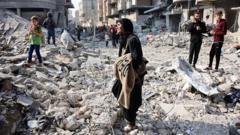Is the UN Genocide Report a Damning Critique of Israel’s Actions in Gaza?

Published: 2025-09-16 07:05:25 | Category: technology
This article explores the recent United Nations report alleging that Israel is committing genocide in Gaza, highlighting the legal implications, international reactions, and the historical context surrounding these grave accusations. The report claims that Israel has violated the Genocide Convention of 1948, which defines genocide as actions intended to destroy a national, ethnic, racial, or religious group. As the conflict escalates, tensions rise internationally, forging divisions between advocates for Palestinian sovereignty and supporters of Israel's military actions.
Last updated: 28 October 2023 (BST)
Key Takeaways
- The UN report alleges Israel is committing genocide against Palestinians in Gaza.
- Israel denies the allegations, claiming its actions are in self-defence.
- International reactions are divided, with some countries calling for an end to hostilities.
- The report details accusations of civilian targeting and humanitarian violations.
- Legal proceedings regarding genocide claims against Israel are underway.
The Context of the Allegations
The report from the UN Human Rights Council follows ongoing violence in Gaza, particularly after the events of 7 October 2023, when Hamas and Islamic Jihad launched attacks on Israel, resulting in casualties and hostage situations. This incident prompted a significant military response from Israel, leading to widespread destruction and humanitarian crises within Gaza.
Central to the report's claims is the assertion that Israel's military operations reportedly include actions that could be classified as genocide. These allegations resonate deeply given the historical context of the term 'genocide', which emerged in the aftermath of the Holocaust, where six million Jews were killed by Nazi Germany. The 1948 Genocide Convention, established by the United Nations, defines genocide and aims to prevent such atrocities from occurring again.
What the UN Report Claims
The UN report presents a detailed account of Israel's actions in Gaza, asserting that they breach international humanitarian law and the Genocide Convention. Key allegations include:
- Deliberate targeting of civilians, which is a violation of the laws of war.
- Imposition of inhumane living conditions, leading to deprivation of food, water, and medical supplies.
- Forced displacement of civilians, particularly in Gaza City.
- Actions aimed at preventing births, including attacks on fertility clinics.
These claims are not only serious but also invoke a complex legal framework that defines genocide and sets strict criteria for proving such allegations. The report's findings contribute to a growing chorus of international condemnation regarding Israel's military strategy in Gaza.
Israel's Response to the Allegations
In response to the UN report, Israel's foreign ministry has vehemently rejected the claims, labelling them as "distorted and false." The ministry accused the commission of inquiry of being biased and claimed that its findings rely on misinformation originating from Hamas.
Israel maintains that its military operations are necessary for national security and are aimed at protecting its citizens from attacks by Hamas, which it designates as a terrorist organisation. The Israeli government argues that any civilian casualties are unintended consequences of military actions directed at Hamas targets.
International Reactions and Implications
The report's release is poised to influence the international community's stance on the Israel-Palestine conflict. Traditional allies of Israel, including the United States and the United Kingdom, are facing increasing pressure to address the humanitarian crises resulting from the ongoing conflict.
At the upcoming UN General Assembly, several countries, including the UK, France, and Canada, are expected to support the recognition of an independent Palestinian state. This move could shift the nature of discussions surrounding the longstanding conflict, which has historical roots dating back over a century.
The Legal Challenges of Proving Genocide
Legally, proving genocide is notoriously complex. The Genocide Convention sets a high threshold for establishing intent to destroy a group, whether in whole or in part. The International Court of Justice (ICJ) is currently reviewing a case brought by South Africa, alleging that Israel has committed genocide against the Palestinian people. This process is likely to take years and will require substantial evidence and legal arguments.
Additionally, political dynamics play a crucial role in how these allegations are received. The continued military support from the US and other allies provides Israel with both military and diplomatic backing, complicating efforts to hold it accountable under international law.
Recent Developments in Gaza
As the conflict continues, reports indicate that Israel's military actions are intensifying, with air strikes targeting various locations in Gaza City. The Israeli Defence Forces (IDF) have ordered civilian evacuations in certain areas, further exacerbating the humanitarian situation. Currently, around one million people are believed to be affected by these displacements.
The impact of military operations extends beyond immediate casualties; humanitarian assessments indicate that the blockade imposed on Gaza has resulted in widespread famine and starvation, raising alarms among international organisations focused on food security.
Voices of Contention
Key Israeli officials have made statements that have drawn scrutiny and accusations of incitement regarding genocide. Defence Minister Yoav Gallant referred to combatants as "human animals", while Prime Minister Netanyahu invoked biblical narratives to justify military actions against Gaza. Such rhetoric has raised concerns among human rights advocates about the potential implications for civilians caught in the conflict.
Looking Ahead: The Future of the Conflict
The path forward remains uncertain as the conflict continues to evolve. The UN report and the subsequent reactions from the international community highlight an escalating divide regarding the interpretation of Israel's actions and the broader implications for Palestinian sovereignty. As discussions about recognition of Palestinian statehood take centre stage, the potential for diplomatic resolutions may hinge on the ability of both parties to engage in meaningful dialogue.
While the UN report is significant, it is just one piece of a much larger puzzle involving history, politics, and humanitarian considerations. The situation in Gaza remains fluid, and the international community's response will likely shape the future trajectory of the Israel-Palestine conflict.
FAQs
What does the UN report say about Israel's actions in Gaza?
The UN report alleges that Israel's military actions in Gaza constitute genocide, citing deliberate targeting of civilians, inhumane living conditions, and forced displacement among its accusations.
How has Israel responded to the genocide allegations?
Israel has categorically denied the allegations, claiming that its military actions are acts of self-defence aimed at protecting its citizens from Hamas attacks and labelling the report as biased.
What are the legal implications of the genocide allegations against Israel?
Proving genocide is legally complex. The Genocide Convention sets a high bar for establishing intent, and ongoing cases at the International Court of Justice will take years to adjudicate.
What are the international reactions to the UN report?
International reactions are divided. Some countries are calling for an end to hostilities and supporting Palestinian statehood, while allies like the US continue to support Israel's actions.
What is the current humanitarian situation in Gaza?
The humanitarian situation in Gaza is dire, with reports of widespread famine, deprivation of essential supplies, and significant displacement of civilians due to ongoing military operations.
As the situation in Gaza unfolds, the implications of the UN report will resonate across the globe, raising critical questions about justice, accountability, and the future of the region. #GazaConflict #GenocideAllegations #InternationalLaw



